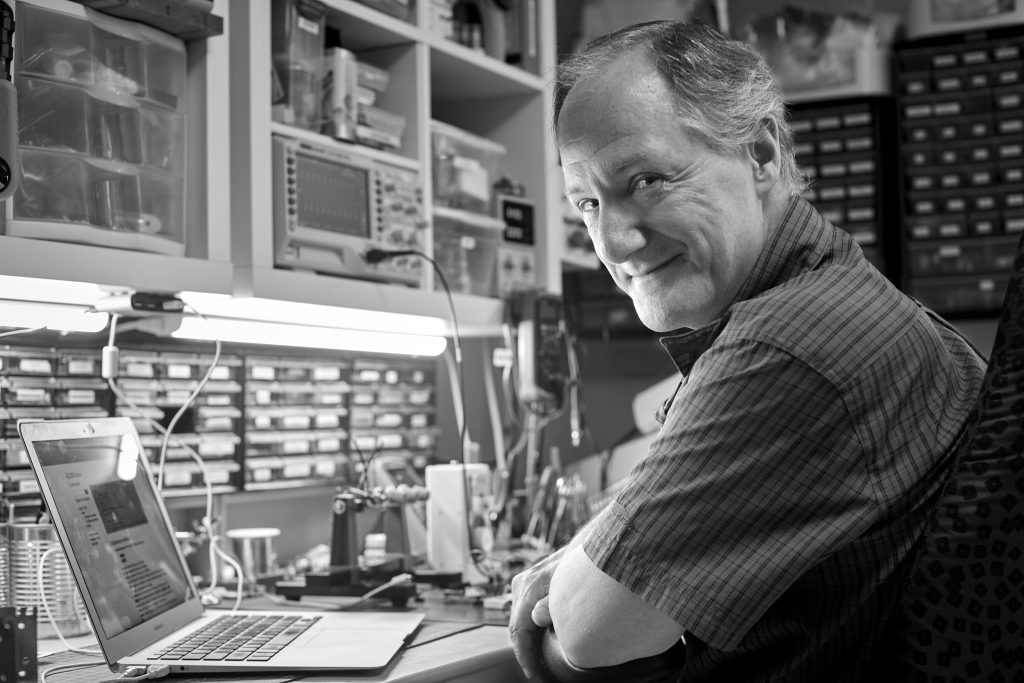Meet our Researchers
Michael LeBlanc

Michael LeBlanc is an Associate Professor of Interdisciplinary Design at NSCAD University. Michael holds an Honours Bachelor of Arts from Guelph University and a Master of Fine Arts from York University. He is an interdisciplinary designer with interests in web, user interface design, physical computing, and product design. His focus is on UI/UX, working in web-based and 3D/Product design. He is currently developing apps and products engaged with data from the Internet.
Michael and his team of Master of Design students have been involved in numerous projects with a variety of companies, including a global consultancy firm, an ocean software company, a social enterprise, and a technology company. Through his expertise in design and research, Michael partners with companies to improve their design and communications strategies. Michael explains that some companies don’t know what they’re missing therefore they can benefit from having an external expertise looking at the ‘big picture’ of a company with a new perspective.
Working with a global consultancy firm that facilitates business relationships between the European Union and Canada, Michael’s team completed an assessment of the multimedia tools available to the company and advised on better solutions for training in the future. Michael’s assessment involved an evaluation of current digital and multimedia tools and trends and looked at the future trends. Ultimately, the assessment of the company resulted in new software and techniques to increase collaboration and the transfer of information across the company. The team also updated the company’s website and created an informational video for trade shows, YouTube, and social media channels.
Michael’s graduate students worked with a social enterprise company that sources organic and natural essential oils from countries that are rebuilding from wars and natural disasters. The company sources ingredients for the products directly from farmers in Afghanistan, Haiti, Rwanda, Madagascar, India, Egypt and the Middle East. The company provided a way for many farmers to sell resources derived from their land such as orange blossom and rose essential oil crops, rather than illegal poppy crops to be used in opium production. The essential oils are purchased directly from the farmer and imported to North America to create high-end perfumes. The company required assistance with their launch of a new product to prospective clients. Michael supported the web-design and Solomon Nagler, Associate Professor in Media Arts (Film) at NSCAD, led photography and multimedia.
Michael’s team is currently working with an ocean software company that created an app used to record and track marine observations by the public. These observations are stored in an archive of valuable data used by researchers around the world. The company was looking for assistance with the design aspects of their software. The team explored ways to make the user experience of the app more friendly, engaging, functional and rewarding. Michael explained that the user-friendliness of an app is determined by if the user can find the information they need with the least number of barriers. An analysis was conducted on the app to understand user behavior, such as navigation patterns and where the user exits the app. Additionally, Michael’s team will conduct interviews with app users and conducts focus groups to gain insight to user experience on the app.
Although delayed due to COVID-19, Michael’s most recent project is working with a technology company specializing in monitoring devices for seniors at a low cost. Funded by Mitacs, Michael is working with an interdisciplinary team, including researchers and students from Saint Mary’s University’s Computing and Data Analytics Program and graduate students from the Design Division at NSCAD University, to develop a new monitoring sensor for seniors to prevent accidents at home. The company is aiming to address medication adherence, which refers to whether the patients take their medications as prescribed. Michael said he will take an anthropological approach to understand how older adults operate in their home daily. Any changes in the routine might indicate a potential problem in the household. In addition to this research, interviews with healthcare providers including family members who will help identify how their loved one is managing their life at home. The team’s research will establish an overview of the problem and help inform the development of the sensor.
Students involved in Michael’s projects are not only provided the opportunity to implement their design skills learned in the classroom, but they are also addressing real-life problems. Michael explains that they are given the opportunity to be fearless in their designs. He noted that it can be intimating for students to work on projects with design experts, but experience with industry is something that that cannot be taught in the classroom.
Contact Michael LeBlanc:
mleblanc@nscad.ca
https://generaleccentric.net
